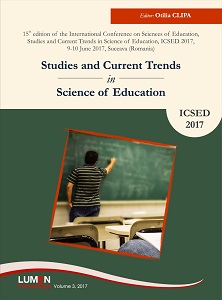Teachers’ Life Satisfaction and Wellbeing: Engagement Influences
Teachers’ Life Satisfaction and Wellbeing: Engagement Influences
Author(s): Aurora Adina Colomeischi
Subject(s): Social Sciences
Published by: Editura Lumen, Asociatia Lumen
Keywords: teachers wellbeing; life satisfaction; burnout; engagement
Summary/Abstract: The European reports indicated lately a decrease of professionalism of teachers, but in the same time the key role of this professional category is emphasized. High quality of education services depends on the quality of teachers’ practices. This quality depends on the personal life of teacher too. The topic of teachers` wellbeing is less explored on Romanian population and in the same time is less seen as an important one by the people in charge; that is why we consider to pursue a study in order to bring out to public attention the need of nurturing teachers, as well.The present study figures out a general image of Romanian teachers’ wellbeing, taking into account factors which could influence it, and which could counteract the burnout.The purpose of the study is to evaluate the engagement, life satisfaction and wellbeing of Romanian teachers. The study also intends to find out the level of burnout experienced by Romanian teachers and thus to identify coping mechanisms. The hypothesis of engagement and emotional intelligence as moderator variables between burnout and wellbeing was tested.The basic framework for the study look at evidence relating to some elements that have been considered to be influences on wellbeing: gender, environment, experience, professional expertise, personal status, emotional intelligence, engagement, life satisfaction.The cross-sectional study involved 385 Romanian teachers. The instruments used were scales and questionnaires for measuring engagement, emotional intelligence (The Schutte Self Report Emotional Intelligence Test), burnout (Maslach Scale) and wellbeing (The Ryff Scales of Psychological Well-Being).The results draw implications for intervention of promoting teachers` wellbeing.
Book: Studies and Current Trends in Science of Education
- Page Range: 139-150
- Page Count: 11
- Publication Year: 2018
- Language: English
- Content File-PDF

